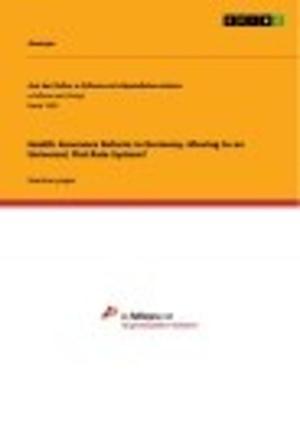Characteristics and Challenges of Microinsurance Operations in Developing Countries
Business & Finance, Finance & Investing, Banks & Banking| Author: | Eva Tischer | ISBN: | 9783656355533 |
| Publisher: | GRIN Verlag | Publication: | January 21, 2013 |
| Imprint: | GRIN Verlag | Language: | English |
| Author: | Eva Tischer |
| ISBN: | 9783656355533 |
| Publisher: | GRIN Verlag |
| Publication: | January 21, 2013 |
| Imprint: | GRIN Verlag |
| Language: | English |
Bachelor Thesis from the year 2012 in the subject Business economics - Banking, Stock Exchanges, Insurance, Accounting, grade: 1,0, Wiesbaden University of Applied Sciences (Wiesbaden Business School), language: English, abstract: Comparing the last centuries´ most significant natural disasters worldwide with the most costly insurance losses, we find that practically none of them had a large influence on commercial insurers. The reason is rather simple: most large-scale disasters happened in developing countries where the majority of population has no insurance coverage. Poor households are not only exposed to more risks, they also have fewer options to overcome them. Without access to social security systems and poorly developed private insurance markets it is hoped that microinsurance provides the low-income population with a possibility of reliable formal protection. Ten years ago hardly any commercial insurance company recognized a profitable market in the so-called bottom of the pyramid; the low-income segments of developing countries. Today, many large insurers, such as Zurich and Munich Re have recognized the potential of emerging markets and spot a multibillion market with the possibility of having a first-mover advantage. However, expansion is still largely driven by governmental organizations and key players of development aid enforcing and supporting community-based organizations. The aim of this thesis is to show how the microinsurance sector is currently developing, under what circumstances insurers can realize growth opportunities and what actions must be taken to provide a valuable financial service.[...]
Bachelor Thesis from the year 2012 in the subject Business economics - Banking, Stock Exchanges, Insurance, Accounting, grade: 1,0, Wiesbaden University of Applied Sciences (Wiesbaden Business School), language: English, abstract: Comparing the last centuries´ most significant natural disasters worldwide with the most costly insurance losses, we find that practically none of them had a large influence on commercial insurers. The reason is rather simple: most large-scale disasters happened in developing countries where the majority of population has no insurance coverage. Poor households are not only exposed to more risks, they also have fewer options to overcome them. Without access to social security systems and poorly developed private insurance markets it is hoped that microinsurance provides the low-income population with a possibility of reliable formal protection. Ten years ago hardly any commercial insurance company recognized a profitable market in the so-called bottom of the pyramid; the low-income segments of developing countries. Today, many large insurers, such as Zurich and Munich Re have recognized the potential of emerging markets and spot a multibillion market with the possibility of having a first-mover advantage. However, expansion is still largely driven by governmental organizations and key players of development aid enforcing and supporting community-based organizations. The aim of this thesis is to show how the microinsurance sector is currently developing, under what circumstances insurers can realize growth opportunities and what actions must be taken to provide a valuable financial service.[...]















